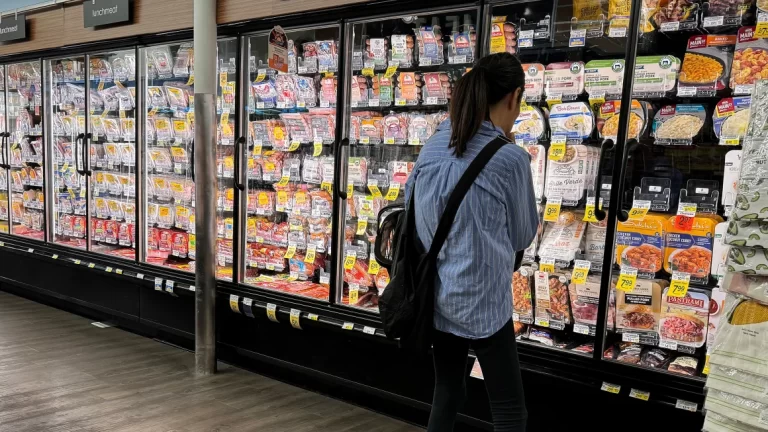The US economy is on the verge of an extremely rare achievement.
Economic growth in the first half of the year was solid, with the economy expanding a robust 2.8% annualized rate in the second quarter, according to fresh Commerce Department figures released Thursday, which are adjusted for inflation and seasonal swings.
Stocks surged in the morning after the economy’s powerful show of resilience, but later lost steam and closed the day mixed. The Dow rose 81 points, or 0.2%, after jumping more than 500 points earlier in the session. The S&P 500 fell 0.5% and the Nasdaq Composite lost 0.9%. That comes after the benchmark index and tech-heavy Nasdaq on Wednesday logged their worst day since 2022.
Gross domestic product, the broadest measure of economic output, was much stronger in the second quarter than economists had predicted. The GDP report showed that businesses are continuing to invest and that consumers are still opening their wallets. That’s key, because consumer spending is America’s economic engine, accounting for about two-thirds of US economic output.
As the economy continued to expand from April through June, inflation resumed a downward trend and seems to be on track to slowing further toward the Federal Reserve’s 2% target.
America’s economy is about to stick what’s called a “soft landing,” which is when inflation returns to the Fed’s target without a recession — a feat that’s only happened once, during the 1990s, according to some economists.
The latest GDP report showed that a key gauge of consumer demand picked up in the second quarter to an annual rate of 2.9%, matching the rate in the fourth quarter of 2023 for the strongest pace in two years. A measure of business investment also strengthened in the April-through-June period.
The current health of the American economy shows that the Fed, with Jerome Powell at the helm as chair, has successfully handled inflation so far, with the finish line coming into clear view. The Fed beginning to cut interest rates indicates that central bank officials feel confident that inflation is under control just enough.
The economy’s enduring strength is also a boon for the Biden administration. Despite the Fed aggressively raising interest rates to tamp down inflation, which have been perched at a 23-year high since last July, the economy has so far avoided a recession. Last year, the resilience of the US consumer shocked economists who widely expected an economic downturn to ensue.
“Today’s GDP report makes clear we now have the strongest economy in the world,” President Joe Biden said in a statement Thursday. “The Vice President and I will keep fighting for America’s future — a future of promise and possibilities, of ordinary Americans doing extraordinary things.”
But even as the broader economy remains robust, Americans have still felt sour. Inflation is an economy-wide problem, so the pessimism has been felt broadly. Purchasing a home in many markets across the country remains out of sight, with home prices at a record high and mortgage rates still painfully elevated. The booming job market in the aftermath of the Covid-19 pandemic has recently returned to normal, and it’s becoming a lot tougher to find a new job.
Waiting on the Fed
Fed officials meet next week to set monetary policy, and they’re widely expected to hold interest rates steady. The meeting will also offer a chance for the Fed to communicate whether or not it has gained any additional confidence that inflation is under control. Either way, it’s clear that officials are pleased with the economy’s performance so far.
“Current data are consistent with achieving a soft landing, and I will be looking for data over the next couple months to buttress this view,” Fed Governor Christopher Waller, a key central banker, said earlier this month at an event in Kansas City. “While I don’t believe we have reached our final destination, I do believe we are getting closer to the time when a cut in the policy rate is warranted.”
Wall Street traders are overwhelmingly betting that the Fed will decide to cut rates in its September 17-18 meeting.
Fed Chair Jerome Powell hasn’t given a definitive signal that rate cuts are coming, but he has provided some subtle hints. Powell earlier this month told lawmakers that “elevated inflation is not the only risk we face,” pointing to how much the labor market has cooled recently. The Fed chief has said that unexpectedly higher unemployment would prompt the central bank to cut rates sooner, since in addition to stabilizing prices, the Fed is also responsible for maximizing employment.
“Prices are easing and growth is strong. We had some worries about slowing GDP last June but those haven’t panned out,” David Russell, global head of market strategy at TradeStation, said in a note Thursday. “The second half could be in good shape for the bulls. Goldilocks is getting stronger and the risk of stagflation is fading. There’s not much stag and not much ‘flation.”
— CutC by cnn.com


